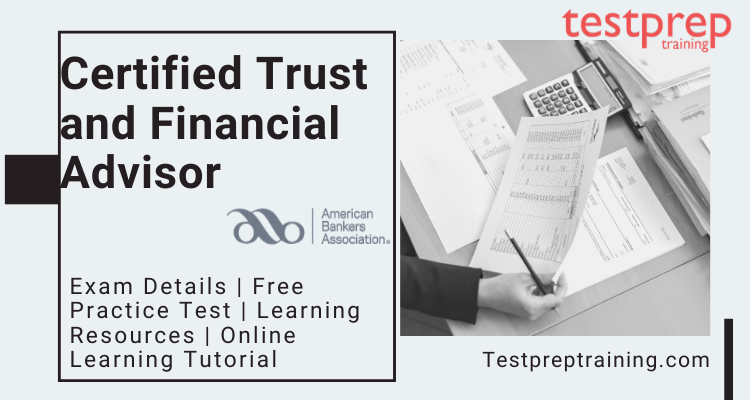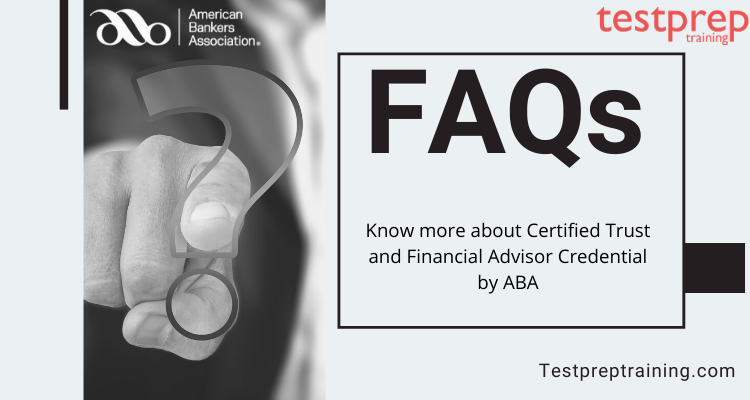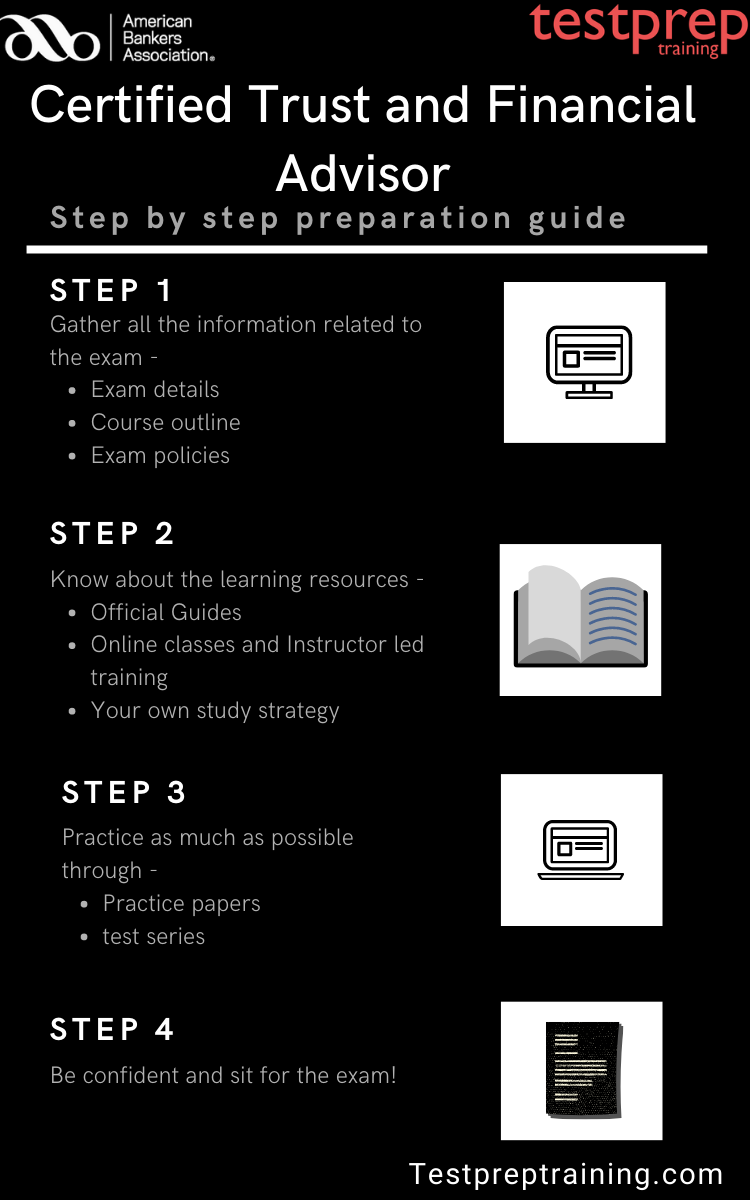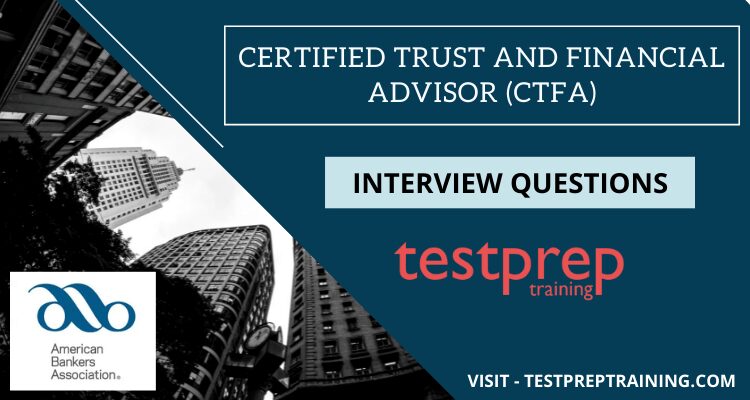Certified Trust and Financial Advisor

Certifications are the portable proofs of ability. Certification programs are a way to enhance credibility, self-image, and encourage life-long learning and professional development. Certified Trust and Financial Advisor (CTFA) is a professional designation offered by the American Bankers Association (ABA), which provides training and knowledge in taxes, investments, financial planning, trusts, and estates.Certifications can differentiate you from other professionals in your field. They help you demonstrate that you have a commitment to understanding and excelling in your profession. This can give you an advantage, which is particularly important in today’s competitive market. Let us get into details of the Certified Trust and Financial Advisor (CTFA) Certification.
What is Certified Trust and Financial Advisor (CTFA) Certification?

Certified Trust and Financial Advisor (CTFA) is a professional designation offered by the American Bankers Association (ABA), which provides training and knowledge in taxes, investments, financial planning, trusts, and estates. The CTFA credential is appropriate for professionals who have a career in banking, broking, financial planning, taxation or trust administration.
CTFA Exam Overview
- No. of questions – 200 questions
- Time allowed – 4 hours
- Use of calculators – permitted
- Cost of the exam – $725
- Cost of retaking – $425
- Type of questions – multiple-choice questions
Note: ABA certifications are based on U.S. laws and regulations and are therefore not offered outside the U.S.
CTFA Exam Requirements
The following prerequisites must be med before registering for the exam –
- Ten (10) or more years’ experience in wealth management
OR
- Five (5) years minimum experience in wealth management AND a bachelor’s degree
OR
- Three (3) years minimum experience in wealth management AND completion of ONE of the following wealth management training programs:
- ABA Trust Certificates (Foundational, Intermediate and Advanced) – earned online, at an ABA Trust School, at an ABA-led in-bank Trust School or a combination of these. CTFA Exam Online Prep is required if all three certificates are completed online.
- Campbell University’s Trust & Investment Management Degree
- Cannon Financial Institute Trust Schools (Level I, II and III)
- Dakota Wesleyan University’s Graduate Certificate in Trust Management Degree
- Florida Trust and Wealth Management Schools (Junior and Senior level) earned through Florida Bankers Association and completion of the ABA CTFA Exam Online Prep.
- University of Delaware’s Trust Management Minor (when coupled with a Finance or Financial Planning major)
Exam Results
The results for the exams are immediately displayed on the screen as ‘pass/fail’ for mostly computer-based exams. Occasionally, instant outcomes are not provided while statistical analysis is conducted. Official score reports delivered via email within 6 weeks after the close of the exam window.
CTFA Exam Schedule
Check the eligibility requirements to determine that you qualify.
Purchase the exam. Payment must be made by credit card. (You will be prompted to create a Certification Manager account.)
Complete and submit the application that appears following the purchase.
You will receive an Approval/Denial email from ABA within two weeks after receiving your application, along with additional details about the exam site. If your application is denied, you will receive a refund of your exam fee minus a $100 application fee.
Cancelling or rescheduling policy
If you wish to reschedule or cancel a testing appointment within the same exam window, you must contact Scantron at least 2 business days before the scheduled appointment. Canceling or rescheduling a testing appointment more than 2 business days in advance is subject to a $50 fee. Canceling or rescheduling less than 2 business days in advance of an appointment is not permitted.
Certified Trust and Financial Advisor (CTFA) Interview Questions
Maintain the CFTA
To maintain your Certified Trust and Financial Advisor (CTFA) in good standing, the following are required:
- 45 CE credits every 3 years
- Annual renewal fee
- Adherence to the Code of Ethics
Other Exam policies
It is very important to be in terms with the policies and terms & conditions of taking the exam. you can visit the official site for gathering more information.

Or, to know more, you can visit – CTFA credential FAQs
Syllabus Outline
The CTFA exam outline covers the following topics:
CTFA Exam updated course outline (December, 2020).
DOMAIN 1: FIDUCIARY PRINCIPLES AND APPLICATIONS (9%)
Task 1: Understand and articulate fiduciary principles
Knowledge of:
a. What it means to be a fiduciary
b. Different fiduciary standards – ’40 act, reg bi, Uniform Trust Code
c. Fiduciary standard vs. Suitability standard (moved from ethics section)
d. The prudent investor rule
e. OCC Reg 12 CFR 9
Task 2: Understand and articulate fiduciary responsibilities
Knowledge of:
a. Powers
b. Duties
c. Uniform Acts/Codes
d. Safekeeping of Assets
e. Environmental Issues
f. Accountability – Who assumes/is ascribed fiduciary responsibility
Task 3: Identify and interpret duties related to legal structure.
Knowledge of:
a. Different legal entity types commonly used to hold assets – Trust, LLC, LLP, IRA, TIC, JTWROS, SOLE PROPRIETORSHIP
b. How different legal entity structures align to meet client’s objectives
c. How to identify structural challenges/conflicts
d. Asset location (taxable, tax-deferred) and how it informs asset allocation
DOMAIN 2: INTEGRATED PLANNING AND ADVICE (FINANCIAL AND TAX) (28%)
Task 1: Develop a financial plan and/or investment selection.
Knowledge of:
a. Goals
b. Time horizon
c. Risk tolerance
d. Income sources
e. Review of a client’s tax return
f. Net worth
g. Educational planning
h. Cash flow analysis
i. Budget
j. Insurance types and usage
k. Debt management
Task 2: Identify and interpret types of ownership interests.
Knowledge of:
a. Powers of appointment
b. Types of joint ownership
Joint tenancy with right of survivorship (JTWROS)
Tenancy in common (TIC)
Tenancy by entirety (TBE)
c. Controlling document
Beneficiary designations
Transfer on Death (TOD)/payable on death (POD)
d. Community property versus separate property
Task 3: Educate clients in regard to estate planning.
Knowledge of:
a. Current client goals
b. Probate versus non-probate assets
c. Powers of appointment
d. Incapacity
e. Disclaimers
f. Gifting techniques for trust and individuals to optimize transfer tax planning
g. Planning and administering for clients with special needs
h. Philanthropic intent and options to optimize transfer tax planning
i. Digital assets
j. Modeling an estate plan flow with terms and dollar calculations
k. Knowledge of estate and gift tax limits and unused exemptions
l. Business succession planning
m. Educational planning
Task 4: Consult and implement retirement strategies.
Knowledge of:
a. Types of IRA accounts
b. Qualified versus non-qualified plans
c. Social Security
d. Medicare/Medicaid
e. Employee stock ownership plans (ESOPs)
f. Net unrealized appreciation (NUA)
Task 5: Educate clients regarding the use of insurance to mitigate risk.
Knowledge of:
a. Life insurance
b. Health insurance
c. Property and casualty insurance
d. Homeowner’s insurance
e. Disability insurance
f. Long-term care insurance
g. Umbrella insurance
h. Malpractice insurance
Task 6: Analyze and interpret income tax reporting.
Knowledge of:
a. Individual income tax
b. Fiduciary tax
c. Foundations, charitable trusts and split interest trusts tax
d. Business tax (LLC, LLP, FLP, S Corp, C Corp)
e. Foreign tax reporting requirements
Task 7: Identify, communicate, and apply generation-skipping transfer tax (GSTT).
Knowledge of:
a. Skip persons/trusts
b. GSTT
c. Taxable distributions
d. Taxable termination
e. Planning strategy
Task 8: Understand and explain fiduciary income tax.
Knowledge of:
a. Simple versus complex
b. Grantor trusts
c. Fiscal and calendar year end filings
d. Distributable net income (DNI)
e. 65-day rule
f. 645 election
g. Right of withdrawal power
h. Treatment of capital gains
i. Foreign tax withholding
Task 9: Understand and apply knowledge of federal estate and gift tax.
Knowledge of:
a. Determine taxable estate assets
b. Estate tax
c. Marital and charitable deductions
d. Portability
e. Payment of taxes
f. Gift tax exclusion
g. Potential difference between federal and state transfer taxes
Task 10: Coordinate distributions from retirement vehicles.
Knowledge of:
a. Required minimum distributions
b. Ability to withdraw
c. Penalties for early withdrawals
d. Rollovers
e. Qualified charitable distribution (QCD)
DOMAIN 3: ASSET MANAGEMENT – INTERACTION OF ALL ASSET TYPES (19%)
Task 1: Profile and understand a client’s risk appetite.
Knowledge of:
a. Inquiry/profiling techniques to learn about the client, their financial resources and all relevant assets
b. Risk dimensions (market risk, liquidity risk, concentration risk, credit risk, reinvestment risk, inflation risk, time horizon risk) and client’s appetite for risks
Task 2: Recommend an appropriate investment strategy based on goals and objectives.
Knowledge of:
a. Asset allocation and asset location (taxable, tax-deferred structures)
b. Prudent investor rule
c. Concentration of assets
d. Time horizon
e. Client needs
f. Trust provisions
g. Risk tolerance
h. Current and remainder beneficiary needs
i. Tax considerations
Task 3: Measure, compare, and communicate investment performance for clients.
Knowledge of:
a. Time-weighted versus dollar-weighted
b. Risk adjusted
c. Benchmarks and indices
Task 4: Identify economic and market outlook concepts.
Knowledge of:
a. Monetary policy
b. Government fiscal policy
c. Inflation
d. Interest rates
e. Gross domestic product
f. International currency/assets/markets
g. Economic cycles
Task 5: Implement multi-asset class investment strategy.
Knowledge of:
a. Equities
b. Fixed income
c. Convertible securities
d. Mutual funds
e. Closely held businesses
f. Real estate and farms
g. International assets
h. Master limited partnerships
i. Stock options
j. ETFs
k. Oil, gas, and minerals
l. Commodities
m. Currencies
n. Precious metals
o. Prohibited Industries
p. Alternative investments
q. Environmental, social and governance (ESG)
Task 6: Create and manage portfolios.
Knowledge of:
a. Modern portfolio theory
b. Equity investment management approaches
c. Fixed income investment management approaches
d. Hedging strategies
e. Tax efficient management
DOMAIN 4: ADMINISTRATION OF TRUST ACCOUNTS (16%)
Task 1: Review nature and characteristics of legal entity structure and account capacity.
Knowledge of:
a. Trusts
b. Estates
c. Guardianships/conservatorships
d. Custodians
e. Agencies
Task 2: Review and interpret trust provisions.
Knowledge of:
a. Trust interests (current, remainder, vested)
b. Understanding beneficiary financial situation
c. Right to statements and copy of trust agreement
d. Mandatory and discretionary distributions (full versus limited)
e. Ascertainable standards (HEMS)
f. Power to adjust
g. Uniform Trust Code (UTC)
h. Rights of withdrawal
i. Crummey powers
j. Unitrust and annuity calculations
k. Final distributions and settlement
Task 3: Classify transactions using principal and income accounting.
Knowledge of:
a. Fee calculation and allocation
b. Real estate income and expenses
c. Income (interest, royalty, rental), dividends, and capital gains
d. Taxes
e. Additional expenses
f. Governing document versus statutory guidelines
g. Distribution criteria (from income, principal, P&I)
Task 4: Determine roles and fiduciary responsibilities.
Knowledge of:
a. Trustee’s duties and powers
b. Financial power of attorney
c. Grantor powers
d. Directed Trustee
e. Trust protector
f. Power to decant/reform
Task 5: Apply and administer common types of trusts.
Knowledge of:
a. Revocable trusts
b. Irrevocable trusts
c. Marital trusts (Examples for Internal Blueprint Only: QTIP/SLAT/Q-DOT)
d. Irrevocable life insurance trusts (Examples for Internal Blueprint Only: ILIT)
e. Split interest trusts (Examples for Internal Blueprint Only: GRIT/GRAT/GRUT)
f. Charitable interest trusts (Examples for Internal Blueprint Only: CRUT/CRAT/CLAT/CLUT)
g. Intentionally defective trusts (Examples for Internal Blueprint Only: IDGT/BDIT)
h. Qualified personal residence trusts (Example for Internal Blueprint Only: QPRT)
i. Pet trusts
j. Blind trust
k. Silent trusts
l. Dynasty trust
m. Special needs/supplemental needs trusts
n. Other legal entity structures holding assets (LLC, LLP, corporation, partnerships)
DOMAIN 5: RISK/COMPLIANCE MANAGEMENT (15%)
Task 1: Maintain compliance with Bank Secrecy Act (BSA)/Anti-Money Laundering (AML).
Knowledge of:
a. Source of funds
b. Identity of beneficial owners, beneficiaries, and other interested parties
c. Expected transactions as they relate to all interested parties
d. BSA
e. AML
f. Suspicious Activity Reports (SAR)
Task 2: Execute the pre-acceptance process to eliminate potential risk.
Knowledge of:
a. Your client (KYC)
b. OFAC
c. Capacity
d. Due diligence
e. Enhanced due diligence situations
f. Foreign clients and beneficiaries
g. Unique assets
h. Concentrated assets
i. Environmental site assessment and compliance with Comprehensive Environmental Response, Compensation, and Liability Act (CERCLA)
Task 3: Review and remediate overdrafts.
Knowledge of:
a. Principal and income accounting
b. Uniform Principal and Income Act (UPIA)
c. Unauthorized loans (e.g., Regulation O)
Task 4: Perform administrative reviews pursuant to internal policies or external regulations.
Knowledge of:
a. Regulation 9
b. Internal policies
c. Asset allocation in alignment with investment policy statement
Task 5: Apply the formal requisites of establishing a fiduciary account.
Knowledge of:
a. Written agreements
b. Trust Situs
c. Governing law
d. Resignation/acceptance
DOMAIN 6: ETHICS (6%)
Task 1: Comprehend and articulate fiduciary responsibilities.
Knowledge of:
a. Duty of loyalty
b. Duty to inform
c. Duty of impartiality
d. Duty to account
e. Breach of trust and personal liability
f. Confidentiality
g. Privacy
h. Undue influence
i. Disclosure of compensation
Task 2: Recognize the signs of financial and elder abuse and how and when to report.
Knowledge of:
a. Definition of elderly and vulnerable adults
b. Change in client behavior
c. Client competence/ capacity
Task 3: Clarify the limits of capacity to advise.
Knowledge of:
a. Unauthorized practice of law
b. Limitation of tax advice
Task 4: Identify, disclose, and/or avoid potential conflicts of interest.
Knowledge of:
a. Self-dealing
b. Gifts to and from clients and vendors
c. Business solicitation
d. Compensation arrangements
e. Related parties and affiliates
f. Proprietary investments
Task 5: Adhere to investment regulatory requirements.
Knowledge of:
a. Insider information
b. Equal treatment of accounts
c. Directed brokerage
d. Disclosures
e. Prudent investor standards
f. Control person
DOMAIN 7: RELATIONSHIP MANAGEMENT (7%)
Task 1: Summarize and document the client relationship.
Knowledge of:
a. Family dynamics and extended relationships of clients
b. Family tree
c. Related parties
d. Other trusted advisors and designations
e. Differing beneficial interests
f. Cash needs versus wants and balancing interests
g. Overall relationship net worth
h. Alternate solutions
Task 2: Manage client expectations.
Knowledge of:
a. Document limitation
b. Monte Carlo simulations – cash needs and projections
c. Communication preferences and frequency
d. Timing of deliverables
e. Tax reporting
f. Capacity and role
g. Behavioral finance
Task 3: Evaluate and develop new business.
Knowledge of:
a. Asset retention strategies
b. Developing relationships with internal/external partners or professionals
c. Strategies to encourage referrals
CTFA Exam Preparation resources

There are numerous resources which can be used for preparation. but it is possible with only right set of resources to crack the exam. let us have a look at handful of resources that are beneficial for preparation.
Study guides by ABA
The American Banking Association recommends some of the study guides which can be appropriate for preparation. The guides are the reliable source for studying and cover almost whole syllabus. You can refer to guides through links mentioned below –
- Reference Guide to Wealth Management and Trust: Fiduciary and Trust Activities
- Reference Guide to Wealth Management and Trust: Financial Planning
- Next, Reference Guide to Wealth Management and Trust: Investment Management
- Reference Guide to Wealth Management and Trust: Tax Law and Tax Planning
Online classes and instructor-led training
There are many online training programs that are made available by educational sites to help in the CTFA exam preparation. You can find the training programs that are best suitable to you according to the syllabus and availability of time. There are online classes as well as instructor-led classes which offers interactive way of learning. You can clear your doubts without any hesitation and take the test series along with the courses from the same site.
Your own study strategy
In order to succeed your self-study will serve as a strong pillar for you. You have to determine your own strategy for studying and you can categorize the stuff into one that can be memorized and that needs hands-on practice. You can break down the large domains into smaller ones in order to learn things properly. Make your timetable and try to follow that as strictly as possible and stay away from your distractions as much as possible. Also, remember that it is very important for you to keep revising after some time in order to grasp things properly.
Practice papers and test series
Sample papers and test series, helps you to figure out where in preparation are you lagging behind. Try to take as many CTFA exam practice questions as you can and solve as much sample papers too. You can find many reliable sites here you will get paid and free sample papers and test series for exam with quality content. This will build confidence in you and even will prevent you feeling strange on the day of exam. Solving many of them will increase your confidence. Try a free CTFA practice test now!


